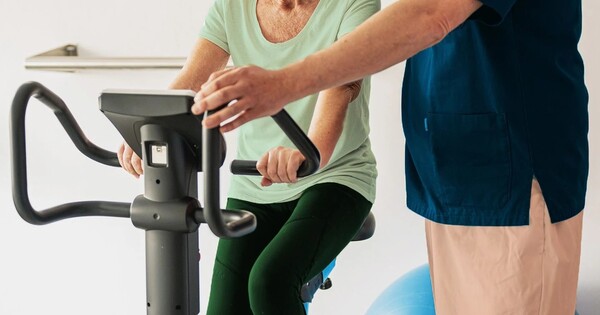Patients with metastatic breast cancer can benefit from targeted physical training to improve their quality of life and reduce tiredness. This is supported by an international randomized multicenter study. Disease- and therapy-related symptoms were significantly reduced after the nine-month training program, which included two sessions per week. This was associated with a higher quality of life when compared to the control group. The German Cancer Research Center (DKFZ), the National Center for Tumor Diseases (NCT) Heidelberg, and Heidelberg University Hospital all played important roles in the study. The European Union-funded project was coordinated by the University Medical Center Utrecht.
Maintaining or improving quality of life and alleviating fatigue are important goals in the care of cancer patients. Not only the disease itself, but also the necessary therapies can severely impair quality of life. Many patients suffer from fatigue syndrome, which is characterized by persistent physical, emotional and mental exhaustion.
“Especially women with advanced cancers such as metastatic breast cancer, who usually receive long-term therapy, can benefit greatly from good management of disease- and therapy-related symptoms,” says Karen Steindorf, head of a research division at the DKFZ and NCT Heidelberg. “We hope that the encouraging results of our PREFERABLE-EFFECT study will help to ensure that as many patients as possible are offered the opportunity to take part in a targeted training program.”
We hope that the encouraging results of our PREFERABLE-EFFECT study will help to ensure that as many patients as possible are offered the opportunity to take part in a targeted training program.
Karen Steindorf
Targeted activation, rather than rest, is the appropriate measure to counter fatigue and other stressful symptoms. This has already been proven in studies for patients in the early stages of breast cancer, but there is still no evidence of a corresponding benefit for advanced disease. The PREFERABLE-EFFECT study has now provided this proof.
The randomized controlled trial comprised 355 women and 2 men who had metastatic breast cancer. All study participants got basic exercise instructions and were given an activity tracker to monitor how much exercise they completed in their daily lives. “The training group of 178 individuals also participated in an individually tailored and clinically supervised training program twice a week that comprised activities to improve balance, muscle strength, and endurance. One of the two training sessions in the latter three months was also carried out using an app,” explains Joachim Wiskemann from Heidelberg University Hospital, whose sports therapy working group inspected and supervised the Heidelberg study participants.

At the start of the study and after 3, 6 and 9 months, the participants were asked about their quality of life using a standardized questionnaire that took into account physical, mental and emotional aspects of quality of life. In addition, a standardized questionnaire was used to objectify fatigue symptoms. Physical fitness was tested at the beginning and at three-month intervals on the bicycle ergometer.
The structured training program led to a statistically significant improvement in quality of life and a significant reduction in fatigue. Complaints such as pain and shortness of breath decreased significantly over the course of the study. The fitness test was also better in the training group than in the control group.
“These are very encouraging training effects that the patients can feel in their everyday lives,” comments Karen Steindorf. “Structured training improves quality of life in a relevant way and enables women with advanced breast cancer to lead a more active life. We were also able to demonstrate greater participation in social life. Based on the PREFERABLE-EFFECT data, there is now good evidence to recommend that people in advanced stages of the disease should also take part in a targeted training program.”
















